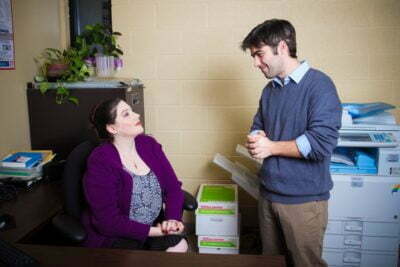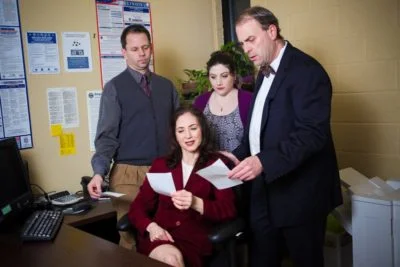Spinning into Butter
Directed by Andrew Pond
Produced by Eclectic Theatre
Tigers Unfortunately Still Spinning
Eclectic Theatre Company seems to have chosen to make this year’s theme plays about social issues from fifteen years ago that are still just as current. When I last saw them, they were doing Take Me Out, Richard Greenberg’s play about an openly gay professional athlete. Now they are producing Rebeca Gilman’s 1999 Spinning into Butter, which depicts the panicked, inept response of a university to racism. Eclectic again tells its story beautifully, and leaves you frustrated with how slowly the world seems to move.
The story takes place at the fictional Belmont College in Vermont. Zoë Mikel Stites’s set design immediately informs you what kind of school this is: ivy is climbing up a white brick wall outside the window. Her accuracy recreating the office of an ancient college building is remarkable, it looks just like my university’s English building. Within, the Dean Sarah Daniels (Jessica Lauren Fisher) is trying to convince a student, Patrick Chibas (Rolo Rodriguez) to apply for a scholarship for Hispanic students. Patrick doesn’t like the term “Hispanic,” and thinks it indicates whoever set this policy is out of touch with the students they serve, but Sarah convinces him it’s worth swallowing his pride over. A short while later, the school learns that a black freshman has been receiving threatening messages.
The faculty are horrified. Sarah’s ex-boyfriend Ross (Patrick Iven), a professor of arts appreciation, feels everybody is collectively responsible for this incident. The other Deans, Catherine Kenney (Lisa Savegnago) and Burton Strauss (David Elliott) know they must immediately identify and expel this racist. They are, however, even more horrified to learn Sarah has contacted the police. Now an internal matter has the potential to embarrass the school, so they need to come up with a way to prove how seriously they take these issues and save their image. Ross suggests campus-wide forums on diversity. The other Deans eagerly agree.
The results are not pretty. Meanwhile, the harassment against the black student is continuing, and Sarah becomes increasingly frustrated with her idiotic colleagues’ insistence on using formulaic language and shutting down any conversation they think follows an improper line of thought. Though she shares the title of “Dean,” Sarah’s background is in social work, and she came from Lancaster, Pennsylvania. The other deans do not truly regard her as an equal, though they depend on her experience working in community colleges to tell them what minorities think. You could see her as representative of lower level administrators who have to justify and modify their superiors’ edicts. Much of the second act is devoted to a monologue she delivers on how her attitude about race has changed many times, but hardly improved. Fisher’s performance anchors the show. At every step we understand that she is well-intentioned, but so tired from the constraints she works within and her own doubts about what is right, it feels easier to give up. (Gilman did not have any black characters onstage, probably to foreground the main characters’ inability to interact with them productively.)
Pat Iven, as Ross, allows Fisher to play off of him by delivering his character as pompous and condescending, but still committed to understanding her. Unfortunately, to get to that point, Gilman created a romantic relationship between their characters that isn’t really interesting, except to illustrate Ross and the professors he represents have difficulty with human interactions in general outside hypothetical. As sound designer, Iven found some hilariously awkward clips of glee clubs singing spirituals. The other characters are either caricatures or functions. Savegnago’s Dean Kenney is jealous and prissy. Dean Strauss is such a deluded blowhard even the other characters comment on it. David Belew plays him as written. Director Andrew Pond could, perhaps, have stretched the script to find some depth in these characters, but Gilman didn’t give them any, and Sarah’s introspection is enough for one play.
The campus policeman Mr. Meyers (Dave Elliott) and the students Patrick and Greg (Jonathan Helvey) are also functions to a degree. Elliott and Rodriguez play them with earnestness, and Helvey’s goes through the most transformation in just his two scenes. They represent the possibility of true discourse among the working class and undergraduates outside the confines of political correctness. They see people as individuals instead of fungible parts of a system, and are willing to listen without the intent of condemning and demanding penance. I think Gilman’s confidence was misplaced and oversimplifies. However, her play does have the power to spark the kinds of personal exchanges that are where real growth occurs, and Eclectic Theatre tells the story effectively. Coming so recently from university myself, I recognized everything represented in the story, and I was lucky in my social issues theatre teacher. Lots of people involved in higher education experience a similar emotional attachment to this play, and be glad someone understands.
Recommended
Jacob Davis
[email protected]
Reviewed January 12, 2015
For more information, see Spinning into Butter’s page on Theatre in Chicago.
Playing at the Athenaeum Theatre Studio 2, 2936 North Southport Ave, Chicago. For tickets, call 773-935-6875 or visit athenaeum.org. Tickets are $25. Plays Thursday-Saturday at 8:00 pm, Sunday at 2:00 pm, and January 31 and February 7 at 2:00 pm. Runs through February 8. Running time is two hours and fifteen minutes with one intermission.




